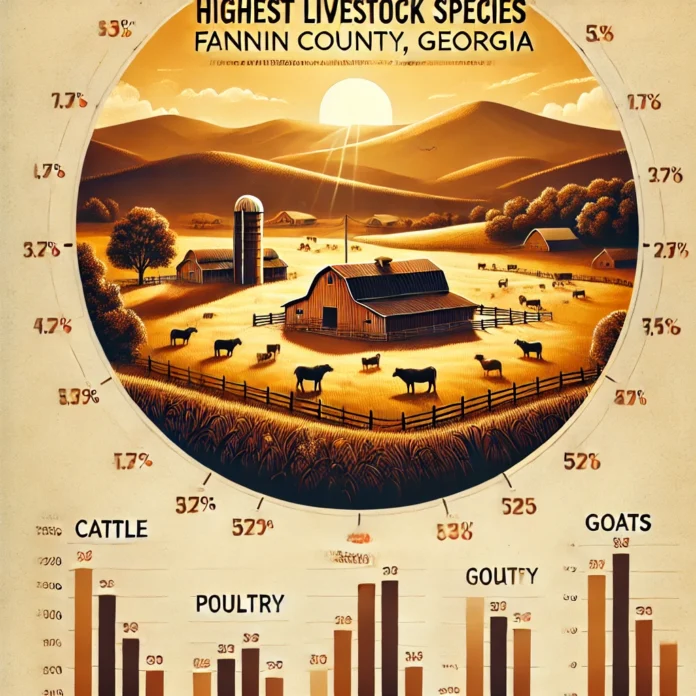The farmland and gentle hills of Fannin County in Georgia serve as a backdrop for the farming and livestock industries that thrive in the region. Have you ever thought about which livestock is the most commonly reared in this region? The answer lies in the Fannin County livestock sector, which is renowned for its exceptional economic impact and contribution towards the sustainability and well-being of the local traditions and values.
The Unparalleled Success of Fannin County Cattle Ranchers
Being Fannin County’s cattle farmers second to none in terms of both quantity and quality for over many years. The county is recognized as a leading beef and dairy farmer, boasting a lucrative economy supplemented by cattle farming. Ranchers take advantage of the county’s wide expanse of green pastures, clean water supply, and moderate temperature for raising quality herds.
These local cattle raisers also participate in the rapidly growing beef industry in Fannin County, which has become one of the major agricultural sectors in this state. There are both small and large family-based farms and businesses in the area, which makes it one of the most important regions in livestock production for the state of Georgia.
What Makes Cattle Farming So Prevalent There?
- Climate: The favorable conditions include mild winters and rich pastures which allows Fannin County to be perfect for cattle rearing the whole year.
- Economics: Combining demand with supply, beef, and milk-producing cattle provide farmers with their most sought source of income.
- Cultural Traditions: Many families in Fannin County have been raising cattle for generations, where farming knowledge and practices are taught and passed along through the family.
The Importance of Poultry Farming
Though cattle may be the utmost, poultry farming is equally as prosperous in Fannin County. Georgia is the number one producer of poultry in the nation and Fannin County does its component in this flourishing sector.
A large number of farmers manage poultry flocks by raising broilers (meat-type chickens) as well as layers (egg-type chickens). They also enjoy the higher income poultry farming provides. Due to the controlled environment of poultry farms, high production and efficiency are guaranteed.
Difficulties Encountered by Poultry Farmers
Disease Control: There is a great risk of disease outbreaks in poultry farming that can wipe out adequate flocks and income.
Regulations & Costs: Farmers are required to meet certain standards and purchase strict hygiene equipment.
The Introduction of Goat & Sheep Farming
Goat and sheep farming is becoming increasingly popular in Fannin County. While more dominant livestock species are cattle or poultry, these animals have shown increasing acceptance due to a greater need for specialty meats and milk as well as fleece.
Advantages of Goats & Sheep Farming
Easily managed: Unlike other livestock such as cattle, these animals need less feeding space and meat, which is beneficial for small farms.
Lesser known markets: Goat products, like goat milk, cheese, and lamb meat, as well as goat products, provide elephant communities and health-conscious people with easily accessible food options.
Swine Farming: A Lesser-Known Business
Despite being less known than poultry and cattle farming, people in Fannin County have started adopting small-scale swine farming for the production of pork. Farmers in this area produce pork either as a mix with other livestock or as niche farms focused on specific local demand.
Like any other type of animal husbandry, swine farming is not without challenges, especially with waste and odor control. Nonetheless, these activities can still be performed profitably given the right planning, infrastructural investment, and compliance with the set standards.
FAQs
Which cattle breed is most frequently spotted in Fannin County?
Locally bred Angus and Hereford cattle are among the most frequently spotted Hereford breeds owing to their sturdy build and superior quality beef.
In what way does poultry farming benefit the economy in this region?
Poultry farming is a great source of employment and greatly adds to the state’s agricultural export figures.
Is it worthwhile to venture into goat farming in Fannin County?
It is indeed, as many small goat farmers are thriving because of soaring demand for goat milk, cheese, and even meat.
Do organic livestock farms exist in Fannin County?
Today, yes. The number of farmers adopting organic livestock farming is increasing to fulfill consumer requirements.
What do you think are the principal difficulties of livestock farmers of Fannin County?
Local farmers are mainly challenged by climatic changes, the cost of feeds, and competition in the market.
Conclusion:
Cattle are not only large in number but also the most economically significant livestock in Fannin County. This county has diverse livestock industries such as goat and sheep and even swine farming, but poultry farming is next in line after cattle grazing, whereas sheep farming is gradually increasing.
With agricultural evolution and a rich farming history, Fannin County stands as a bastion for cattle production in Georgia. If you are a farmer or a mere enthusiast of farming, the county provides a captivating image of the association between cattle and the economy as well as community development.


